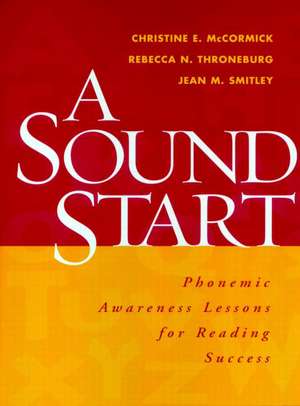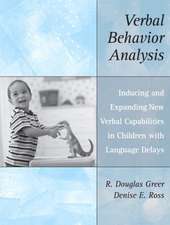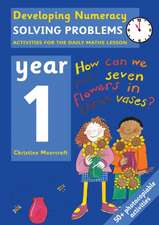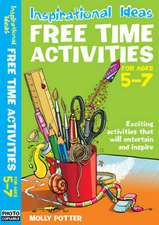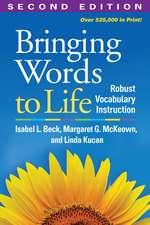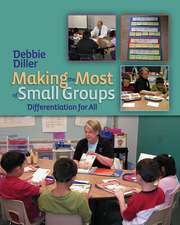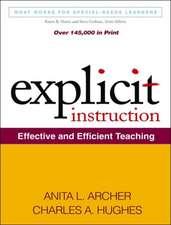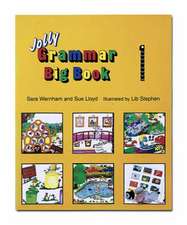A Sound Start: Phonemic Awareness Lessons for Reading Success: Solving Problems in the Teaching of Literacy
Autor Christine E. McCormick, Rebecca N. Throneburg, Jean M. Smitleyen Limba Engleză Paperback – 25 iul 2002
This book is an ideal resource for any teacher who wants to include explicit phonemic awareness instruction in an early reading program. In one easy-to-use 8 1/2 x 11 volume, the authors present three separate sets of phonemic awareness lessons, complete with scripted directions and reproducible learning materials and assessment tools. Incorporating a variety of fun and engaging activities, each set of lessons is field-tested and research-based. Included are developmentally sequenced lessons for the whole class and small groups, more intensive lessons for children struggling with phonemic awareness, and class lessons on the consonant phonemes to help children hear and process the sounds of American English. The lesson sets can be used independently or in combination with each other, and can easily be adapted to meet the needs of specific classes.
Din seria Solving Problems in the Teaching of Literacy
-
 Preț: 214.79 lei
Preț: 214.79 lei -
 Preț: 268.12 lei
Preț: 268.12 lei -
 Preț: 375.46 lei
Preț: 375.46 lei -
 Preț: 361.66 lei
Preț: 361.66 lei -
 Preț: 396.70 lei
Preț: 396.70 lei -
 Preț: 206.04 lei
Preț: 206.04 lei - 21%
 Preț: 169.02 lei
Preț: 169.02 lei - 20%
 Preț: 248.15 lei
Preț: 248.15 lei - 21%
 Preț: 214.89 lei
Preț: 214.89 lei - 18%
 Preț: 188.83 lei
Preț: 188.83 lei - 21%
 Preț: 217.82 lei
Preț: 217.82 lei - 20%
 Preț: 247.87 lei
Preț: 247.87 lei - 21%
 Preț: 156.46 lei
Preț: 156.46 lei - 16%
 Preț: 314.51 lei
Preț: 314.51 lei - 20%
 Preț: 172.74 lei
Preț: 172.74 lei - 21%
 Preț: 216.99 lei
Preț: 216.99 lei - 20%
 Preț: 231.89 lei
Preț: 231.89 lei - 19%
 Preț: 273.60 lei
Preț: 273.60 lei
Preț: 291.66 lei
Nou
Puncte Express: 437
Preț estimativ în valută:
55.82€ • 57.16$ • 46.43£
55.82€ • 57.16$ • 46.43£
Carte tipărită la comandă
Livrare economică 18 martie-01 aprilie
Preluare comenzi: 021 569.72.76
Specificații
ISBN-13: 9781572307612
ISBN-10: 1572307617
Pagini: 297
Dimensiuni: 210 x 280 x 21 mm
Greutate: 0.91 kg
Ediția:New.
Editura: Guilford Publications
Colecția Guilford Press
Seria Solving Problems in the Teaching of Literacy
ISBN-10: 1572307617
Pagini: 297
Dimensiuni: 210 x 280 x 21 mm
Greutate: 0.91 kg
Ediția:New.
Editura: Guilford Publications
Colecția Guilford Press
Seria Solving Problems in the Teaching of Literacy
Public țintă
Professional and Professional Practice & DevelopmentNotă biografică
Christine E. McCormick, PhD, is Professor of Psychology at Eastern Illinois University in Charleston, Illinois, where she teaches courses in developmental psychology, early childhood assessment, and early reading. She has a doctoral degree in educational psychology from the University of Minnesota and is a former Montessori teacher and school psychologist. Widely published, she brings to this book over 25 years of experience in developing early reading materials for young children.
Rebecca N. Throneburg, PhD, is Associate Professor of Communication Disorders and Sciences Department at Eastern Illinois University, where she teaches courses in normal language development, phonological awareness, and language and literacy. Her doctoral
degree in speech-language pathology is from the University of Illinois. She conducts research in the school setting regarding service delivery and collaboration among professionals.
Jean M. Smitley, MS, is Associate Professor of Communication Disorders and Sciences Department at Eastern Illinois University, where she teaches a course in phonetics and phonological development. She has also collaborated with kindergarten teachers to provide phonological awareness training to kindergartners. Her master's degree is from Eastern Illinois University, and she has focused on reading development and disabilities in her postgraduate course work.
Rebecca N. Throneburg, PhD, is Associate Professor of Communication Disorders and Sciences Department at Eastern Illinois University, where she teaches courses in normal language development, phonological awareness, and language and literacy. Her doctoral
degree in speech-language pathology is from the University of Illinois. She conducts research in the school setting regarding service delivery and collaboration among professionals.
Jean M. Smitley, MS, is Associate Professor of Communication Disorders and Sciences Department at Eastern Illinois University, where she teaches a course in phonetics and phonological development. She has also collaborated with kindergarten teachers to provide phonological awareness training to kindergartners. Her master's degree is from Eastern Illinois University, and she has focused on reading development and disabilities in her postgraduate course work.
Cuprins
1. Phonemic Awareness: An Introduction
-- Phonemic Awareness and Learning to Read
-- Instruction in Phonemic Awareness
-- Assessment of Phonemic Awareness
-- General Instructional Issues
-- The Lessons in This Book
-- References
2. Introduction to the Whole-Class and Small-Group Lessons
-- General Guidelines
-- Sequence of Skills
-- Plan of the Lessons
-- Data on Effectiveness
-- Assessment
-- References
-- Phonemic Awareness Assessment
3. The Whole-Class and Small-Group Lessons
-- Lesson 1: Concept of Words
-- Lesson 2: Rhyme Recognition and Discrimination
-- Lesson 3: Rhyme Choice
-- Lesson 4: Rhyme Production
-- Lesson 5: Syllable Counting
-- Lesson 6: Syllable Blending
-- Lesson 7: Syllable Deletion
Lesson 8: Onset-Rime Blending
Lesson 9: Onset-Rime Blending
Lesson 10: Review of Rhyming and of Syllable and Onset-Rime Blending
Lesson 11: Initial Phoneme Identification
Lesson 12: Initial Phoneme Production
Lesson 13: Final Phoneme Identification
Lesson 14: Final Phoneme Production
Lesson 15: Medial Phoneme Isolation
Lesson 16: Phoneme Counting
Lesson 17: Blending Two- and Three-Phoneme Words
Lesson 18: Phoneme Blending
Lesson 19: Phoneme Segmentation
Lesson 20: Review of Initial, Medial, and Final Sounds and of Phoneme Counting, Blending, and Segmenting
4. Individualized Instruction in Phonemic Awareness
The Individualized Lessons
Assessment for the Individualized Lessons
Effectiveness of the Lessons
Getting Started
References
Assessment for Individualized Lessons
Progress Chart
5. The Individualized Lessons
Lesson 1: Beginning Sounds /m/ and /s/
Lesson 2: Beginning Sounds /f/ and /n/
Lesson 3: Beginning Sounds /p/ and /t/
Lesson 4: Review of Beginning Sounds
Lesson 5: Letters m and s for Beginning Sounds
Lesson 6: Letters f and n for Beginning Sounds
Lesson 7: Letters p and t for Beginning Sounds
Lesson 8: Letters m, s, and t for Beginning Sounds
Lesson 9: Letters n, p, and t for Beginning Sounds
Lesson 10: Review of Letters for Beginning Sounds
Lesson 11: Letters for n, p, t
Lesson 12: Ending Sounds /n/, /p/, /t/
Lesson 13: Ending Sounds /n/, /p/, /t/
Lesson 14: Beginning Letters m, s, f and Ending Letters n, p, t
Lesson 15: Beginning letters n, p, t and Ending Letters n, p, t
Lesson 16: Letters for Beginning and Ending Sounds
Posttest and Take-Home Tiny Books
6. Phoneme Characteristics and Lessons
Importance of Understanding Phoneme Production
Phonemes in Words
Similarities between Phonemes
Description of Phoneme Production
References
Lessons for Specific Phonemes
Phoneme /b/ (letter b)
Phoneme /k/ (letters c, k)
Phoneme /d/ (letter d)
Phoneme /f/ (letter f)
Phoneme /g/ (letter g)
Phoneme /h/ (letter h)
Phoneme /?/ (letter j)
Phoneme /l/ (letter l)
Phoneme /m/ (letter m)
Phoneme /n/ (letter n)
Phoneme /p/ (letter p)
Phoneme /r/ (letter r)
Phoneme /s/ (letter s)
Phoneme /t/ (letter t)
Phoneme /v/ (letter v)
Phoneme /w/ (letter w)
Phoneme /j/ (letter y)
Phoneme /z/ (letter z)
Phoneme / / (digraph sh)
Phoneme / / (digraph ch)
Phoneme / /('sing') (digraph ng)
Phonemes / ('thumb') /ð/ ('those') (digraph th)
Appendix: Books, Materials, and Alternative Books for Each Class Lesson
Index
-- Phonemic Awareness and Learning to Read
-- Instruction in Phonemic Awareness
-- Assessment of Phonemic Awareness
-- General Instructional Issues
-- The Lessons in This Book
-- References
2. Introduction to the Whole-Class and Small-Group Lessons
-- General Guidelines
-- Sequence of Skills
-- Plan of the Lessons
-- Data on Effectiveness
-- Assessment
-- References
-- Phonemic Awareness Assessment
3. The Whole-Class and Small-Group Lessons
-- Lesson 1: Concept of Words
-- Lesson 2: Rhyme Recognition and Discrimination
-- Lesson 3: Rhyme Choice
-- Lesson 4: Rhyme Production
-- Lesson 5: Syllable Counting
-- Lesson 6: Syllable Blending
-- Lesson 7: Syllable Deletion
Lesson 8: Onset-Rime Blending
Lesson 9: Onset-Rime Blending
Lesson 10: Review of Rhyming and of Syllable and Onset-Rime Blending
Lesson 11: Initial Phoneme Identification
Lesson 12: Initial Phoneme Production
Lesson 13: Final Phoneme Identification
Lesson 14: Final Phoneme Production
Lesson 15: Medial Phoneme Isolation
Lesson 16: Phoneme Counting
Lesson 17: Blending Two- and Three-Phoneme Words
Lesson 18: Phoneme Blending
Lesson 19: Phoneme Segmentation
Lesson 20: Review of Initial, Medial, and Final Sounds and of Phoneme Counting, Blending, and Segmenting
4. Individualized Instruction in Phonemic Awareness
The Individualized Lessons
Assessment for the Individualized Lessons
Effectiveness of the Lessons
Getting Started
References
Assessment for Individualized Lessons
Progress Chart
5. The Individualized Lessons
Lesson 1: Beginning Sounds /m/ and /s/
Lesson 2: Beginning Sounds /f/ and /n/
Lesson 3: Beginning Sounds /p/ and /t/
Lesson 4: Review of Beginning Sounds
Lesson 5: Letters m and s for Beginning Sounds
Lesson 6: Letters f and n for Beginning Sounds
Lesson 7: Letters p and t for Beginning Sounds
Lesson 8: Letters m, s, and t for Beginning Sounds
Lesson 9: Letters n, p, and t for Beginning Sounds
Lesson 10: Review of Letters for Beginning Sounds
Lesson 11: Letters for n, p, t
Lesson 12: Ending Sounds /n/, /p/, /t/
Lesson 13: Ending Sounds /n/, /p/, /t/
Lesson 14: Beginning Letters m, s, f and Ending Letters n, p, t
Lesson 15: Beginning letters n, p, t and Ending Letters n, p, t
Lesson 16: Letters for Beginning and Ending Sounds
Posttest and Take-Home Tiny Books
6. Phoneme Characteristics and Lessons
Importance of Understanding Phoneme Production
Phonemes in Words
Similarities between Phonemes
Description of Phoneme Production
References
Lessons for Specific Phonemes
Phoneme /b/ (letter b)
Phoneme /k/ (letters c, k)
Phoneme /d/ (letter d)
Phoneme /f/ (letter f)
Phoneme /g/ (letter g)
Phoneme /h/ (letter h)
Phoneme /?/ (letter j)
Phoneme /l/ (letter l)
Phoneme /m/ (letter m)
Phoneme /n/ (letter n)
Phoneme /p/ (letter p)
Phoneme /r/ (letter r)
Phoneme /s/ (letter s)
Phoneme /t/ (letter t)
Phoneme /v/ (letter v)
Phoneme /w/ (letter w)
Phoneme /j/ (letter y)
Phoneme /z/ (letter z)
Phoneme / / (digraph sh)
Phoneme / / (digraph ch)
Phoneme / /('sing') (digraph ng)
Phonemes / ('thumb') /ð/ ('those') (digraph th)
Appendix: Books, Materials, and Alternative Books for Each Class Lesson
Index
Recenzii
A particular strength of this well-organized book is the inclusion of materials for both whole-class and individual lessons. This makes it an ideal resource for speech-language pathologists (SLPs) and other special service providers working with general education teachers to provide early literacy instruction and intervention for typically developing children as well as those with language and literacy learning risks. Ideally, the shared use of this book will give teachers, graduate students, and SLPs a common way of talking about language and its sounds that they can embed in other reading and writing instruction within the general education curriculum.--Nickola Wolf Nelson, PhD, CCC-SLP, Department of Speech Pathology and Audiology, Western Michigan University
The National Reading Panel, of which I am a member, strongly recommends phonemic awareness training as part of early instruction in reading. A Sound Start contains many excellent and useful ideas for those who want to start students on the road to high achievement in reading. This text should be of great value to teachers, teacher educators, and others concerned with the science of sound reading instruction.--S. Jay Samuels, EdD, Department of Educational Psychology, University of Minnesota, Twin Cities Campus
Finally, completely scripted classroom lessons for helping children develop the phonemic awareness skills essential for successful reading acquisition! Empirically based and field-tested for effectiveness and usability, the lessons include step-by-step directions and all materials necessary for implementation, including pre- and posttests and reproducible student forms. Unique to this book is the provision of three types of lessons: whole-class/small-group phonemic awareness skills lessons, individualized lessons for children needing extra assistance, and whole-class lessons focusing on the acoustic features and production of phonemes to reinforce learning. Teachers, tutors, and reading specialists alike will find this book a wonderful resource.--Natalie Rathvon, PhD, Early Reading Initiative project director, Archdiocese of Washington Schools, Washington, DC
Many want to develop phonemic awareness competencies in children but do not know where to start. This book provides systematic and sound guidance to teachers of beginning readers. The lessons it contains also provide a great start on phonics, developing deep understanding of letter-sound associations and phonemic blending as part of word recognition and production.--Michael Pressley, PhD, Michigan State University
-The National Reading Panel, of which I am a member, strongly recommends phonemic awareness training as part of early instruction in reading. A Sound Start contains many excellent and useful ideas for those who want to start students on the road to high achievement in reading. This text should be of great value to teachers, teacher educators, and others concerned with the science of sound reading instruction.--S. Jay Samuels, EdD, Department of Educational Psychology, University of Minnesota, Twin Cities Campus
Finally, completely scripted classroom lessons for helping children develop the phonemic awareness skills essential for successful reading acquisition! Empirically based and field-tested for effectiveness and usability, the lessons include step-by-step directions and all materials necessary for implementation, including pre- and posttests and reproducible student forms. Unique to this book is the provision of three types of lessons: whole-class/small-group phonemic awareness skills lessons, individualized lessons for children needing extra assistance, and whole-class lessons focusing on the acoustic features and production of phonemes to reinforce learning. Teachers, tutors, and reading specialists alike will find this book a wonderful resource.--Natalie Rathvon, PhD, Early Reading Initiative project director, Archdiocese of Washington Schools, Washington, DC
Many want to develop phonemic awareness competencies in children but do not know where to start. This book provides systematic and sound guidance to teachers of beginning readers. The lessons it contains also provide a great start on phonics, developing deep understanding of letter-sound associations and phonemic blending as part of word recognition and production.--Michael Pressley, PhD, Michigan State University
Descriere
This book is an ideal resource for any teacher who wants to include explicit phonemic awareness instruction in an early reading program. In one easy-to-use 8 1/2"" x 11"" volume, the authors present three separate sets of phonemic awareness lessons, complete with scripted directions and reproducible learning materials and assessment tools. Incorporating a variety of fun and engaging activities, each set of lessons is field-tested and research-based. Included are developmentally sequenced lessons for the whole class and small groups, more intensive lessons for children struggling with phonemic awareness, and class lessons on the consonant phonemes to help children hear and process the sounds of American English. The lesson sets can be used independently or in combination with each other, and can easily be adapted to meet the needs of specific classes.
